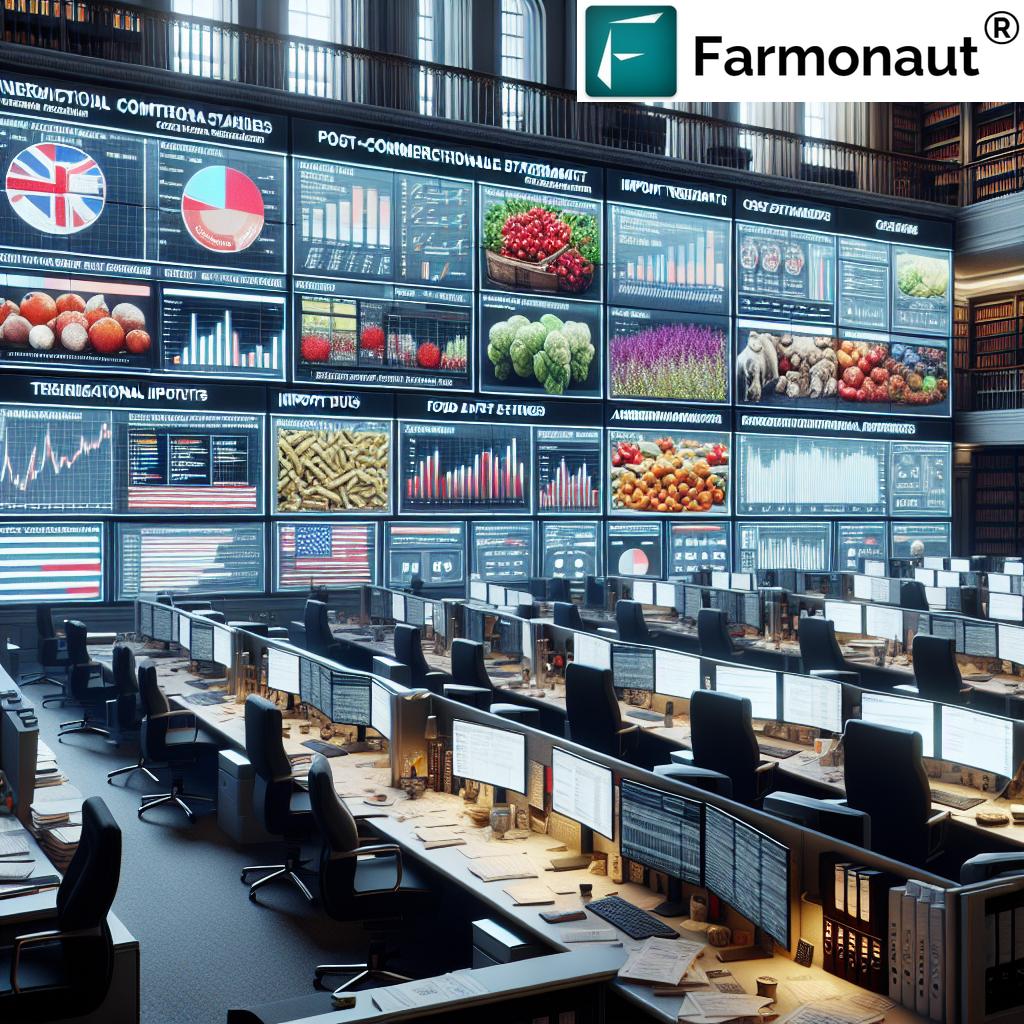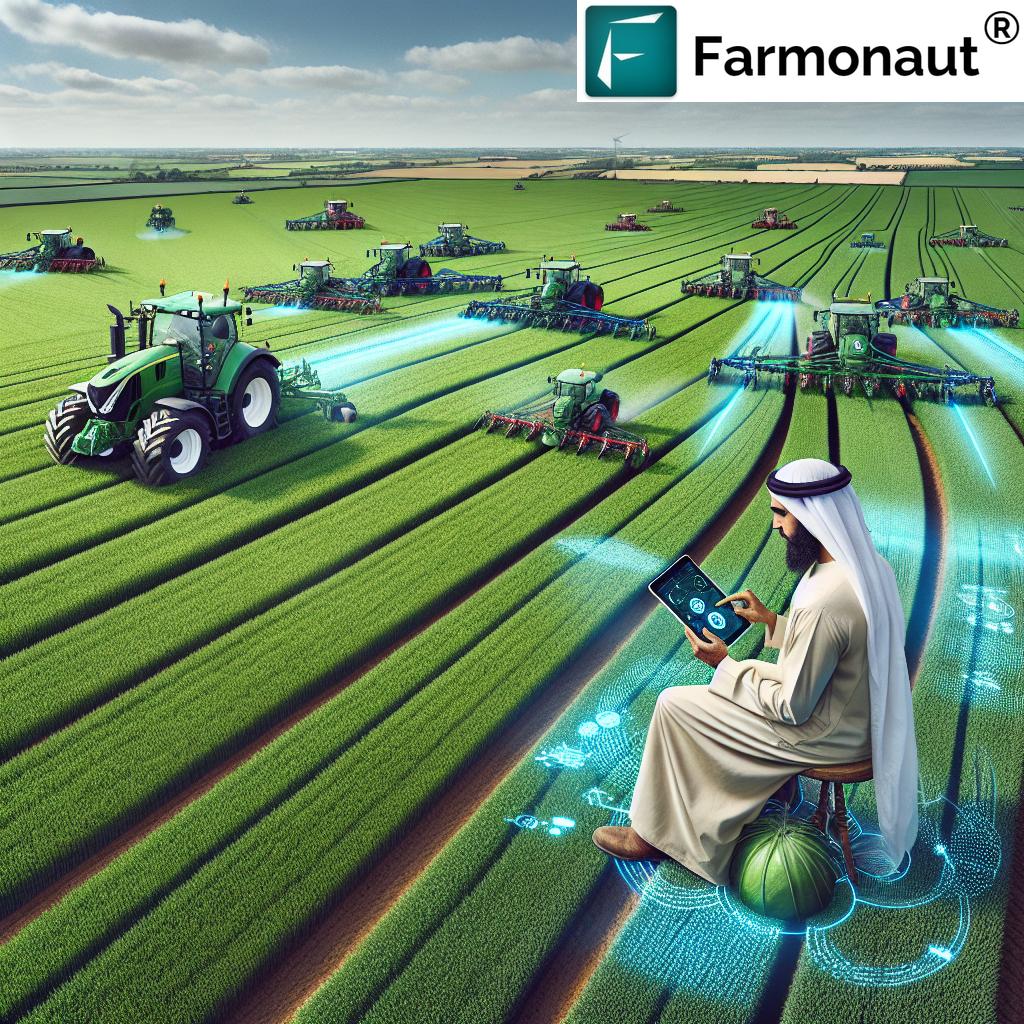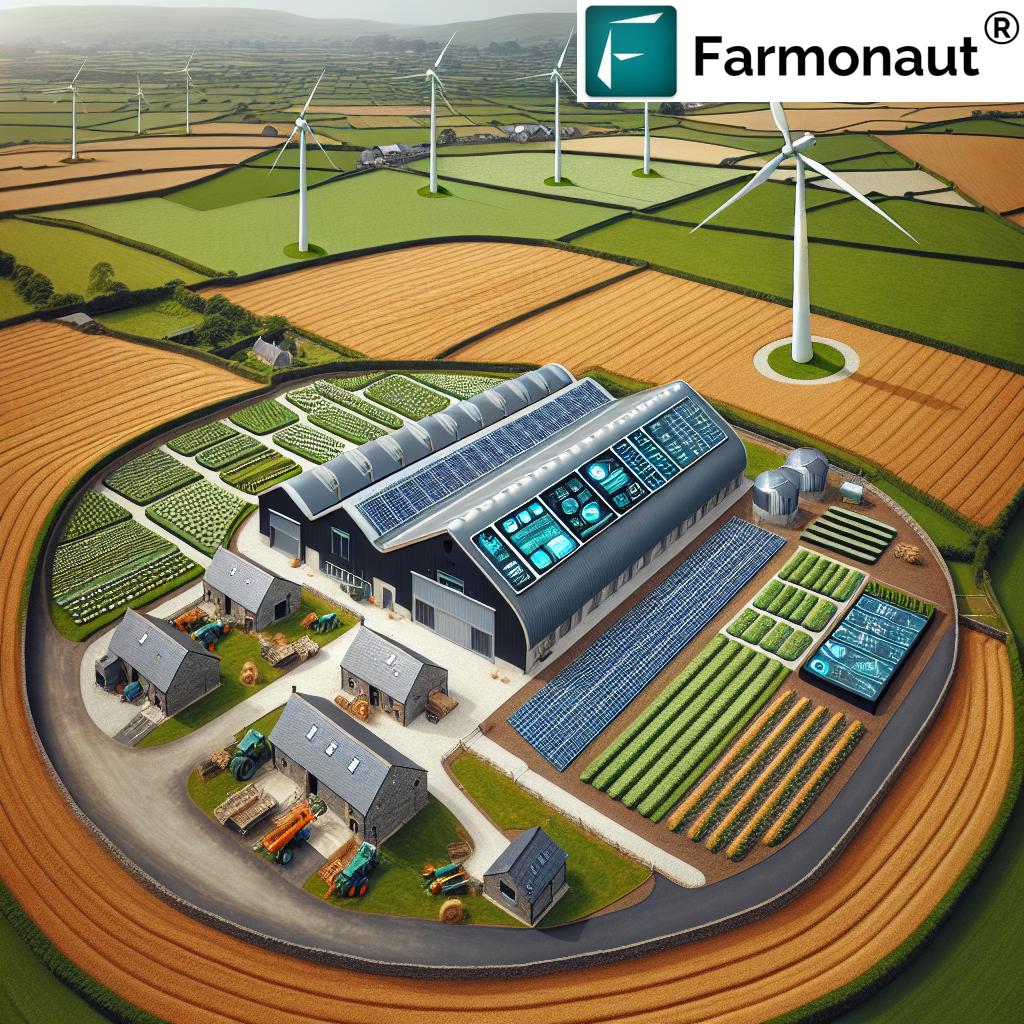UK US Trade Talks: 5 Crucial Barriers Impacting Food and Tech
“UK food exports to the US face tariffs up to 25%, significantly impacting post-Brexit trade negotiations.”
Introduction: Decoding UK US Trade Talks in Food and Tech
The much-anticipated UK US trade talks have emerged as a defining phase in post-Brexit international relations. These discussions are not simply about economics; they touch on food standards regulation, import tariffs, technology innovation, national sovereignty, and the very rules that shape global trade.
This in-depth analysis unpacks the 5 crucial barriers now impacting food supply chains and technological collaborations between Britain and the United States. As trade negotiators convene in Washington and London, their decisions will reshape import-export balances, consumer protections, public finance planning, and more.
As a part of the agricultural ecosystem, organizations like Farmonaut are deeply influenced by these industry-shifting negotiations. While Farmonaut is not a regulatory body, online marketplace, or product manufacturer, its mission—to democratize access to precision agriculture and digital innovation—closely intersects with the outcome of these talks.
In this professional deep-dive, we’ll cover:
- The evolving landscape of UK US trade talks
- Why Britain food standards are non-negotiable for UK policymakers
- How post-Brexit trade barriers impact everything from automotive import tariffs to blockchain-based traceability
- What’s at stake for agriculture, technology, and the future of international trade
- The future-proof solutions offered by the latest in precision agriculture
Trade Overview: Post-Brexit Realities and Stakes
Since the completion of Brexit, the United Kingdom has sought to chart its own course in international trade policy. Crucial negotiations—especially with global giants like the United States—now set the parameters for economic growth, regulatory standards, and strategic partnerships in the digital and agricultural sectors.
Recent comments from Finance Minister Rachel Reeves in Washington underscore the seriousness of the talks: Britain is committed to securing a deal in its national interest without rushing or compromising on critical food standards. The American side, meanwhile, is eager to reduce barriers on a variety of goods, including relaxation of agricultural import rules and the lowering of import tariffs uk on automobiles.
With the UK also aiming to relax post-Brexit trade barriers with the European Union, these talks have outsized importance for government policy, economic direction, and industry standards far beyond 2024.
Farmonaut’s Tech Advancements in Q3
The 5 Crucial Barriers Shaping Food and Tech in UK US Trade Talks
Let us systematically analyze the most significant trade barriers:
- Food Standards Regulation
- Import Tariffs
- Technology & Digital Services Regulations
- Certification Requirements
- Agricultural Subsidies
Each obstacle plays a central role in the UK US trade deal negotiations, with far-reaching implications for agriculture, technology, security, and public finance uk government planning.
“Over 70% of UK food standards differ from US regulations, creating major barriers in ongoing trade talks.”
Comparative Barrier Impact Table: UK US Trade Challenges (2024)
| Barrier Name | Estimated Economic Impact (£/US$ billions) | Affected Sectors | Current Status (2024) | Notes |
|---|---|---|---|---|
| Food Standards Regulation | £4-7B / US$5-9B | Agriculture, Food & Beverage, Retail | Stalemate – UK not conceding on core standards | UK government refusing concessions; strong stakeholder support for upholding national standards |
| Import Tariffs | £2-4B / US$2.5-5B | Automotive, Agriculture, Manufacturing | Ongoing Negotiations | US demands tariff reductions (e.g., autos from 10% to 2.5%); UK hesitant due to potential trade-off elsewhere |
| Technology & Digital Services Regulations | £1-2.5B / US$1.3-3B | Tech, Telecom, Social Media Firms, Software | Contentious – UK resisting US asks for regulatory relaxation | Data privacy, social media rules, digital standards under scrutiny |
| Certification Requirements | £400-700M / US$500-900M | Automotive, Machinery, Agri-Tech | In Review | Mutual recognition a sticking point; creates extra administrative costs for exporters/importers |
| Agricultural Subsidies | £700M-1.5B / US$900M-2B | Agriculture, Food Security | Ongoing Debate | Subsidy structures seen as distorting competition; US, UK, and EU positions diverge |
Estimated Impacts: Context & Relevance
These barriers collectively influence the equilibrium of UK US trade, the global market competitiveness of British and American products, and the sustainability of national food and tech sectors. Understanding their estimated impact provides essential insight for policymakers, industry stakeholders, and solution providers.
Food Standards Regulation: The Crux of UK US Trade Deal Negotiations
No issue is more emblematic of Britain’s post-Brexit stance than food standards regulation. As Finance Minister Rachel Reeves clearly stated in Washington, Britain will not relax standards on food imports—not even in exchange for strategic trade concessions.
- The UK insists on upholding national food safety, animal welfare, and environmental rules, which are generally stricter than current US regulations.
- This position has near-unanimous support among UK farmers, retailers, and a majority of the public, given the heightened awareness of food traceability and authenticity.
- Consequence: The US has signaled understanding, but this barrier remains a central challenge affecting sectors ranging from meat and dairy to processed food and ingredients.
Stakeholders across all levels—farmers, agricultural technology solution providers, and supply chain coordinators—are affected by these standards. For digital innovators, too, traceability and blockchain transparency become invaluable tools to address regulatory hurdles and build trust in international trade.
If your business or cooperative values product integrity, Farmonaut’s blockchain-based product traceability offers transparent, tamper-proof tracking for every stage of the journey from farm to consumer.
How to Interpret Satellite Data for Agriculture | Tutorial | Farmonaut Mobile Apps
UK vs US Food Standards: Key Differences
- Use of growth hormones and antibiotics in livestock
- Pesticide maximum residue levels
- Genetically Modified Organism (GMO) regulations
- Animal welfare requirements throughout the supply chain
- Traceability and food labelling regime
With digital transformation in agriculture, farmers and agri-businesses require robust monitoring and real-time validation. Platforms that combine satellite monitoring, AI-driven advisory, and secure, blockchain-based records play a crucial role in meeting not just standards compliance but future consumer expectations.
The Role of Government and Stakeholder Sentiment
The UK government’s hard line on standards is mirrored by similar attitudes among its global peers in the European Union and other advanced markets. As the Wall Street Journal reported, any shift on food safety could complicate negotiations with the European Union, where alignment is still critical for smooth trade relations and border procedures.
For digital-first companies and agricultural leaders alike, remaining compliant with elevated UK standards is both a requirement and a market differentiator. The era ahead demands robust data integration, traceability, and transparent reporting—cornerstones of Farmonaut’s solutions.
Import Tariffs UK: Economic Fallout of Stubborn Tariff Tensions
Tariff structures on goods ranging from foodstuffs to vehicles are pivotal within UK US trade talks. Recent US demands, citing a draft document referenced by the Wall Street Journal, ask Britain to lower its automotive import tariffs from 10% to as low as 2.5%. Other requests include reductions on key agricultural and manufactured goods.
- Economic Impact: Tariffs of 10%-25% on UK food exports to the US create significant cost burdens for British exporters, reducing competitiveness against domestic and global rivals.
- Broader Risks: Should Britain accede to US demands, it risks losing leverage in European Union trade relations, where similar products face different tariff schedules and regulatory requirements.
- Policy Dilemma: The UK thus faces a difficult balancing act: reducing import tariffs to secure a US deal could upset existing EU arrangements, while maintaining high barriers frustrates American demands.
Examples: Tariffs in Focus
- Automobile imports from the US: currently 10% tariff
- Agricultural products: beef, poultry, and grain face variable tariffs up to 25%
- Processed foods and beverages: subject to both tariff and non-tariff barriers
For UK-based agri-food businesses, such as those using remote sensing or carbon footprinting solutions, being able to demonstrate sustainable supply chains can help meet international standards and differentiate exports in tariff-sensitive markets.
- Benefit of Farmonaut’s Carbon Footprinting: Provides exporters with credible, data-backed records to support environmental compliance in stringent regulatory regimes. See how Farmonaut can help your business.
Tariffs and National Government Response
Decision-making around tariffs is central to national public finance. As stated by Minister Reeves, the UK government is determined not to make unilateral concessions based on foreign government pressure, underscoring statutory independence and the quest for a trade agreement “that’s in our national interest.”
Discover Farmonaut’s Advanced Agri Solutions: Precision Crop Area Estimation – Egypt Case Study
Technology Partnership Agreements and Digital Services Regulations UK
Beyond food, the UK US trade talks are heavily influenced by rapidly evolving technology, cloud computing, and digital services regulations uk. In 2024, the discussion extends far past tariffs—covering issues from data transfer and privacy to social media governance and artificial intelligence.
- Current Challenge: US negotiators urge Britain to relax digital rules and encourage the free flow of data and services, which would lower barriers for American tech giants and social media firms.
- UK Position: The British government, however, stresses not “changing our standards based on asks from foreign governments,” holding firm on robust national data privacy regulations and digital governance.
Such regulatory divergence creates friction in otherwise integrated sectors such as fintech, agri-tech, health services, and automobiles—particularly for cross-border cloud services and proprietary digital platforms.
For technology players and agri-businesses committed to data-driven operations, robust compliance is a competitive advantage. Farmonaut’s API and Developer Docs offer seamless, secure integration of satellite and weather data, empowering developers and agricultural research organizations to streamline operations and maintain compliance.
Satellite based WhatsApp advisory for Farmers by Farmonaut
Digital Services: Sector Examples
- Social Media Firms: Face UK-specific rules on harmful content and privacy compliance
- Tech Devices: Subject to accompanying digital certification and localization requirements
- Agricultural Software: Businesses using AI, blockchain, and remote sensing must demonstrate data security, transparency, and traceability
Certification Requirements: Navigating Divergent National Protocols
The challenge of certification requirements is particularly acute in sectors such as automotive and emerging agri-tech, where varying protocols and lack of mutual recognition inflate administrative burdens for exporters and importers alike.
- UK and US regulations often demand duplicate testing, documentation, and third-party audits, especially for food, machinery, and automotive products
- For agricultural producers leveraging digital innovation—such as automated crop health monitoring or sensor-driven resource management—certification must extend to both the product and supporting digital infrastructure.
These compliance hurdles impact small and midsize enterprises most sharply, raising costs and reducing speed to market. For organizations managing fleet operations, platforms such as Farmonaut Fleet Management streamline logistics and help ensure safe, trackable movement of agricultural machinery to ensure compliance while reducing cost.
Agricultural Subsidies: Market Dynamics and International Fairness
A final, persistent barrier in UK US trade negotiations involves agricultural subsidies—a complex issue with implications for food security, global competition, and compliance with World Bank and International Monetary Fund guidance.
- US and UK subsidy regimes differ: The US maintains robust direct support for key crops, while post-Brexit Britain is reconfiguring subsidy models away from Common Agricultural Policy-style payments.
- Subsidies can be viewed as market distorters, affecting everything from pricing and trade balances to supply chain financing.
- Britain’s stance aims to bolster domestic sustainability while staying in line with EU expectations and IMFWB obligations.
For stakeholders seeking fair access to crop insurance or loans, Farmonaut’s crop loan and insurance solutions offer satellite-backed verification, helping reduce fraud risk and supporting bankable, transparent farming operations.
Farmonaut: Precision Agriculture for a Global Marketplace
-
Access your satellite-based farm insights on any device:



-
API Data for Developers: Integrate real-time crop monitoring and weather data:
Learn more about the Farmonaut API |
Read the developer docs. - Large-scale Farm Management: Monitor thousands of hectares, optimize operations, and oversee distributed teams with Farmonaut’s Agro Admin App.
- Get AI-Driven Advisory: Farmonaut’s Jeevn AI delivers adaptive crop management advice, forecast, and risk alerts in real time—visit crop plantation & forest advisory.
Farmonaut’s Role: Enabling Resilient, Data-Led Agriculture
In a world shaped by tariff wars, regulatory divergence, and rising demands for digital traceability, agricultural technology emerges as a force-multiplier. As UK US trade talks evolve and food standards remain a red line for governments in London and Washington, Farmonaut delivers critical tools to ensure resilience, transparency, and sustainable productivity for farmers and agri-businesses worldwide.
Key Farmonaut Solutions—Strategically Relevant for Post-Brexit Britain:
- Satellite-based Crop Health Monitoring: Real-time NDVI, soil moisture, and field scouting empower smarter input usage and better adaptation to evolving international standards.
- Jeevn AI Agricultural Advisory: Harness AI-driven guidance tailored to local realities, delivered instantly via mobile/web/browser app—indispensable for keeping pace with market and regulatory changes.
- Blockchain Traceability: Provide end-to-end, tamper-proof transparency for food and agricultural goods, ideal for meeting British and international compliance and fostering consumer trust.
- Fleet and Resource Management: Streamline machinery, logistics, and harvest operations in line with UK and global best practices with Farmonaut Fleet Management tools.
- Carbon Footprinting: Meet rising environmental compliance demands from public and private sector buyers with accurate emissions tracking.
Frequently Asked Questions – UK US Trade Talks, Food Standards, and Tech
What are the main barriers impacting the UK US trade talks in 2024?
- Food standards regulation disagreements
- Import tariffs on food, automotive, and technology goods
- Technology/data transfer & digital service regulation conflicts
- Certification requirement mismatches
- Disputes over agricultural subsidies
Why won’t the UK government relax food standards?
The UK is committed to maintaining rigorous national standards for food safety, animal welfare, and traceability. This is seen as crucial not only for domestic trust but for upholding integrity in international exports, especially with the European Union. Relaxing standards could undermine both public confidence and ongoing EU relations.
How do post-Brexit trade barriers affect UK agricultural exporters?
Post-Brexit, the UK faces additional documentation, tariffs, and compliance for exports to both the EU and US. Exporters must now meet potentially conflicting regulatory schemes, raising costs and introducing uncertainty. Precision agriculture and technology-driven traceability (such as Farmonaut offers) help bridge these gaps.
Are UK digital service regulations stricter than US rules?
Yes. The UK has implemented robust privacy, security, and harmful content laws for digital service providers and social media firms. US-based tech companies often advocate for lighter regulations, creating friction in digital trade negotiations.
How can farmers leverage technology to remain globally competitive in this context?
Satellite monitoring, AI-based advisory, and blockchain traceability empower farmers to meet evolving regulatory demands and demonstrate transparency/export-readiness. Solutions like Farmonaut’s platform are pivotal for such modernization.
Where can developers get access to precision agriculture data via API?
Developers and businesses can obtain real-time agricultural and weather data through Farmonaut’s API. Comprehensive integration guides are available in the API Developer Docs.
Conclusion: Navigating Trade Barriers with Innovation and Resilience
The UK US trade talks are a complex test of post-Brexit policy, economic risk management, and the adaptability of Britain’s food and technology sectors. These negotiations demand not just shrewd diplomacy, but investment in compliance, innovation, and data-driven transparency.
As the UK government stands firm on standards, tariffs, and digital rules, the need for agile, technology-enabled solutions will only grow. Affordable precision agriculture—enabled by companies like Farmonaut—will help British producers, agribusinesses, and supply chains adapt, thrive, and capture new growth opportunities at home and in global markets.
Whether you’re navigating barriers in food, digital services, or automotive trade, your competitive advantage increasingly depends on real-time insights, robust documentation, and systems that anticipate—rather than simply react to—regulatory shifts. As we move forward, resilient businesses will be those embracing change, championing transparency, and harnessing digital innovation as a bridge across every new border.
Empower your agriculture and trade operations for the next era—explore Farmonaut’s platform today.















